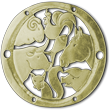Research and Science
Areas of research conducted within the Faculty of Animal Science
- Neuroimmunoendocrine regulation of the mechanisms of animal development and adaptation.
- Comprehensive regulation of brain-intestine axis activity in different animal species.
- Influence of thyroid hormones and environmental xenobiotics on the functions of the hypothalamo-pituitary-ovarian and -thyroid axes in domestic birds and cyprinid fish.
- Chicken, quail and common carp embryos as experimental models in studies concerning the influence of environmental toxicants on physiological processes in the organism.
- The role of growth hormone, prolactin and aquaporins in the regulation of the avian reproductive system function in domestic birds.
- Molecular mechanisms of tissue remodeling of the avian ovary and oviduct during the reproductive cycle with particular emphasis on the role of metalloproteinases.
- The role of glutamic acid and its receptors in the stress response on the level of motivation structures of the brain and adrenal glands.
- Genetic variability and gene expression, mainly fatty acid metabolism-related genes; influence of miR and agomiR on the expression of selected aging genes in fibroblast cells.
- Genetic and environmental factors influencing functional and production traits of dairy cattle in Poland and estimation of genetic parameters and breeding value of farm animals.
- Phenotypic and genetic analysis of quantitative and qualitative traits in livestock and companion animals.
- Production, environmental and economic aspects of dairy and beef herd management in the intensive and sustainable cattle farming.
- Genetic and environmental (organisation and management, nutrition, housing conditions, welfare and biotechnological treatments) factors influencing swine physiological function and production performance.
- Estimation of breeding, reproductive and performance value of equines and dogs.
- Cell biology, histology, histopathology, protein expression, microstructure and meat quality.
- Behaviour of animals used in animal therapy.
- Hygiene of animals’ environment, and abiotic factors influencing animal welfare (geo- and electromagnetic field, suspended dust, disinfectants)
- Research on the optimization of the poultry incubation process
- Parasitic fauna of animals, and the prevention and prophylaxis of parasitic diseases
- Individual differentiation of the honey bees (Apis mellifera) temperature preferences
- The relationships between body size and labor efficiency in ants
- Maturation mechanisms and development competences of livestock and companion animals gametes and embryos
- Mutagenesis and its impact on the level of instability and genome variability in livestock and companion animals
- Analysis of chosen reproductive and functional features of domestic birds
- Study of genome variability using molecular genetics techniques and high-throughput genome analysis tools - NGS and microarrays.
- The effects of genetic and environmental factors in the processes of reproduction, lactation and metabolism of animals
- Mechanism of action of endocrine distruptors in neuronal cells - in vitro studies
- Studies on hormonal control of fish reproduction, an impact of environmental pollutants on fish physiology and ichthyofauna monitoring in inland waters
- The effect of nutritional factors on the development of gastrointestinal tract and immune system of dairy calves
- Prevalence, risk factors, and consequences of ketosis in dairy cows
- Digestive physiology of selected zoo animals
- Effect of fats in the diet of horses





